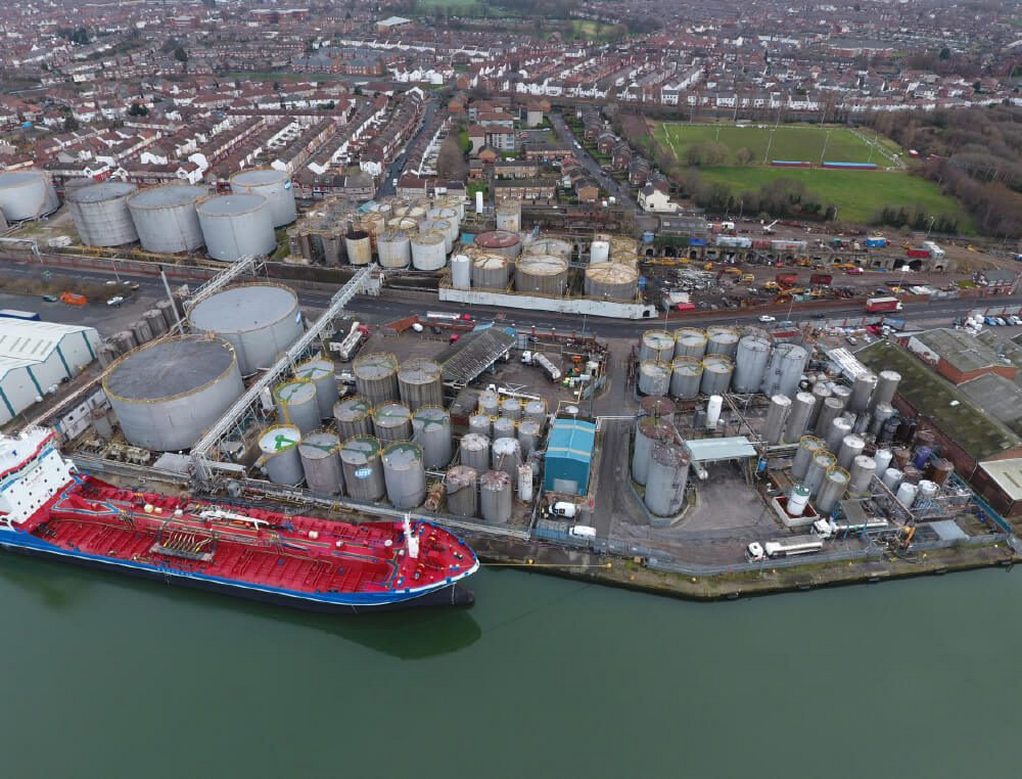UM Terminals is taking its value-add services one step further by offering the pre-treatment of biofuel feedstocks. Used cooking oil (UCO) and rendered animal fat are by far the most abundant raw materials to produce HVO and biodiesel in the UK. Our storage terminals act as a consolidation and pre-treatment hub for these materials for several fuel producers that operate globally.
Bulk storage terminals play a critical role in the supply chain of renewable fuel production by providing a central location for the storage, blending, and distribution of fuels.
These terminals are typically located near transportation hubs such as ports, rail yards, and highways, allowing them to efficiently receive and distribute renewable fuels to end-users.
In the context of renewable fuel production, bulk storage terminals are particularly important enabling the efficient storage and distribution of biofuels, which have different properties than traditional petroleum fuels.
Biofuels, such as ethanol, hydrotreated vegetable oils (HVO) and biodiesel, are typically produced in different locations and require specialised storage and handling equipment to ensure their quality and safety.
Bulk storage terminals can also play a key role in the blending of renewable fuels with traditional petroleum fuels, such as gasoline and diesel. This can help to increase the overall use of renewable fuels and reduce greenhouse gas emissions.
For example, ethanol can be blended with gasoline to create a fuel blend known as E10, which contains 10% ethanol and is commonly used in many countries. Similarly, HVO is a drop-in replacement to Ultra-low sulphur diesel, requires no blending with mineral diesel and offsets greenhouse gas emissions by 90%.
In addition to their storage and blending functions, bulk storage terminals can also provide a range of value-added services to their customers, such as fuel testing, quality control, and transportation logistics. By offering these services, bulk storage terminals can help to reduce costs and improve efficiency throughout the supply chain.
Pre-treatment of UCO and tallow is an important step in the production of biofuels helping to improve the quality, reduce shipping costs and improve yield of the final product.
UCO and tallow can contain impurities such as food particles, water, and other contaminants, which can affect the quality of the biofuel. Filtering the oil through a series of screens and filters can help to remove these impurities and ensure a cleaner, more consistent feedstock.
Heating these materials and settling the water impurities also means that the exported materials contain no water solids which reduces shipping costs and helps biofuel refineries be more efficient in increasing product yield.
Overall, pre-treatment of UCO and tallow is an important step in the production of high-quality biofuels. By removing impurities, reducing free fatty acids (FFA), and increasing the stability of the oil, pre-treatment can help to improve the yield, efficiency, and quality of the final product.
Due to its experience in this area, UM Terminals is seeing a sharp increase in enquiries for its biofuels services, driven by the looming 2030 deadline for the phasing out of new diesel vehicles and the UK government’s 2050 target to reach net-zero carbon.
Tags: Biofuels, Feedstock, UCO, UM Terminals



Recent Posts
Port of Brisbane Unveils Vision 2060 to Drive Smarter, Cleaner, and More Connected Future
Wärtsilä to Deliver Hybrid Propulsion Systems for Vertom Group’s New Low-Emission Vessels
Latvian port receives electric Konecranes Gottwald Mobile Harbor Crane
Sustainable Ocean Economy Vital for Human Development, Says UNDP at UN Ocean Conference
Green Hydrogen Costs in India Could Drop by 40%, Says IEEFA-JMK Report
Cavotec Secures €1.55 Million Shore Power Contract for Port of Antwerp-Bruges
APM Terminals and SANY Marine sign landmark agreement to accelerate decarbonisation
The Port of Gothenburg takes big step towards shore power connection for container and car/RoRo vessels